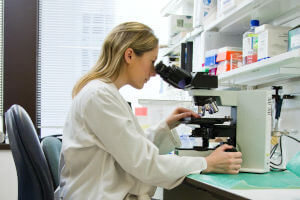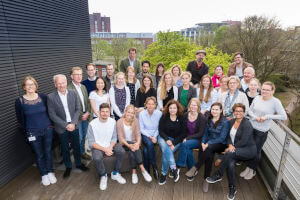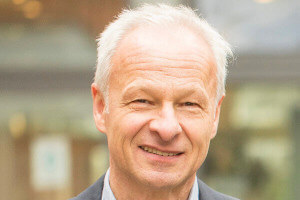Three talented PhD´s
The three doctoral students of Professor Dr. Ulrich Schüller have a common vision: beat children’s cancer. Melanie Schoof, Dörthe Holdhof and Malte Hellwig have been doing intensive research on pediatric brain tumors since the end of 2016 as part of their doctoral theses. Their vision: a better understanding of the development of tumors with the aim of identifying new therapeutic targets. The results are top marks and a hand tool on which their future career can be based: perseverance, the ability to work experimentally and to publish successfully.
Melanie Schoof: CBP. All-rounder and tumor suppressor
Melanie Schoof's research work includes mutations of the coactivator CBP. The protein is involved in a lot of transcription processes - development as well as in the adult organism. Mutations in the protein can lead to the onset of serious diseases such as the Rubinstein-Taybi syndrome (RSTS), a neuro-developmental disorder that entails mental retardation, among other things. Melanie Schoof was able to uncover further properties of the protein as part of her doctoral thesis: On the one hand, she investigated the influence of CBP in brain development and homeostasis in mouse models. "We were able to find abnormalities in the neurogenic zones of the brain, the hippocampus and the subventricular zone and show that CBP is important for both neuronal migration and morphology," explains Melanie Schoof. In addition, she was able to expose the protein as a tumor suppressor in various tumor entities. "The loss of CBP in combination with N-myc leads to the development of aggressive brain tumors," says Schoof. "Tumors in the forebrain and hindbrain developed in the mouse model and this is exactly where our work continues. We want to find out how the two proteins work together and how we can transfer this knowledge to various human diseases.”
https://link.springer.com/article/10.1186/s40478-019-0849-5
Dörthe Holdhof: Brg1
Also Dörthe Holdhof's research is about the development of pediatric brain tumors: It deals with atypical teratoid / rhabdoid tumors (AT/RTs - a rare malignancy of the central nervous system from the group of embryonic tumors that occurs almost exclusively in infants and toddlers. "Numerous processes in early embryonic and brain development depend on correct Brg1 expression," explains Dörthe Holdhof. She found out, that Brg1 plays essential roles in brain development in both hGFAP and Sox2 positive stem cells, whereas the protein performs less critical functions in cerebellar progenitor cells after birth. The conditions under which the loss of Brg1 leads to the formation of AT/RTs will be investigated in a follow-up project.
https://pubmed.ncbi.nlm.nih.gov/31504276/
Malte Hellwig: TCF4 influences brain architecture and tumor activity
The focus of Malte Hellwig's research is on a special germline mutation in transcription factor 4 (TCF4) that causes a developmental disorder with severe intellectual disability, the so-called Pitt-Hopkins syndrome (PTHS). In mouse models, TCF4 was defined as essential for the correct development of the cerebellum and the hippocampus - both extremely important regions of the brain. Malte Hellwig also researched spontaneous mutations in TCF4 that only occur in adult patients with a medulloblastoma (tumor of the cerebellum) of the SHH subtype. In cell culture and in mice, the researcher was able to reproduce the situation and recognize that TCF4 may have a tumor suppressive effect in later phases of brain development. The loss of TCF4 therefore leads to an increase in the proliferation of the tumor cells.
https://onlinelibrary.wiley.com/doi/full/10.1111/ejn.14674
https://link.springer.com/article/10.1007%2Fs00401-019-01982-5
















